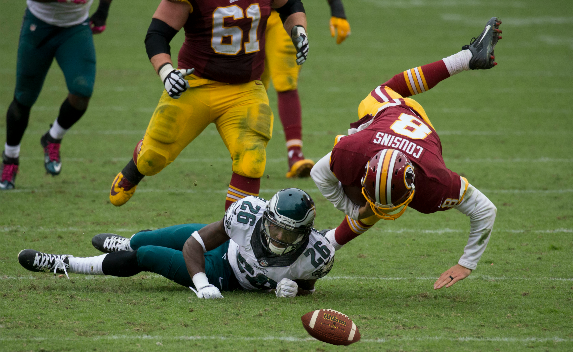NLRB Fumbles the Integrity Ball

A Conflict of Interest in the National Labor Relation Board’s Philadelphia Office
The Philadelphia I grew up in is a die-hard sports city.
Philly fans have been named “the most notorious in the NFL” by the Bleacher Report, and rightfully so. After all, we once installed a misdemeanor courtroom underneath Veteran's Stadium; handling fans’ disorderly conduct clearly took priority over actually winning.
And yes, Philly fans booed and threw snowballs at Santa during a Christmas pageant half time show in December 1968. Perhaps the lack in holiday spirit was because of the terrible weather conditions, the 2-11 season or the fact that “Santa” was just a random kid picked out from the crowd (don't ask).
All this passion gives the City of Brotherly Love a bad rap. But Philadelphians act out because we care about the game – integrity matters.
So you can imagine why Philadelphians got upset when the city’s National Labor Relations Board (NLRB) office, an “independent” federal agency that investigates and adjudicates labor disputes, showed it can’t be impartial.
In December 2015, Dennis P. Walsh, NLRB Director of Region 4, was suspended without pay for 30 days because of his “pro-union conflict of interest.” An investigation by the NLRB’s Inspector General showed that Walsh had misrepresented his time on the board of the Peggy Browning Fund (PBF), a non-profit resource for law students.
Why was this connection grounds for suspension? The Peggy Browning Fund has close union ties.
Walsh has been involved with the NLRB for 32 years, serving as an attorney, board member and finally Region 4 Director. Walsh claimed to have no direct fundraising involvement for PBF while serving as an NLRB official, but the investigation proved otherwise. During work hours, Walsh used his government-issued NLRB email to send pro-PBF messages, an act that could potentially violate the Hatch Act, which banned public employees from actively engaging in politics back in 1939.
Wally Zimolong, the employment lawyer who confronted Pennsylvania legislators about Walsh’s conflict of interest, argues that this situation “shakes the public trust, and at worst [is] a violation of federal laws.” In his letter to lawmakers, Zimolong pointed out that the NLRB’s neutrality was violated by Walsh’s chairmanship of a union activist organization.
According to its website, PBF’s mission is to “educate and inspire the next generation of law students to become advocates for workplace justice.” The Fund promotes networking, fellowships (some of which are at labor unions, including the AFL-CIO, AFSCME and Teamsters, among others) and workshops for students.
They also hold award receptions and conferences to further their support of Big Labor, but their Leadership Circle shows that this support is not one-sided. PBF’s Leadership Circle is a benefits-group “comprised of members who strongly support the mission of the Peggy Browning Fund with annual leadership gifts.” Fifteen members of the 2015 Circle were labor unions.
The NLRB forced Walsh’s resignation as PBF’s board chairman in August 2015. His replacement? The General Counsel for United Steelworkers, Richard J. Brean.
Walsh used his authority, which should have been objective, to review labor issues while chairing a pro-union group. In Philly, we demand objective authority. No referee on the opposing team’s payroll is allowed.
Walsh should be thankful it’s not snowball season in Philadelphia… yet.





